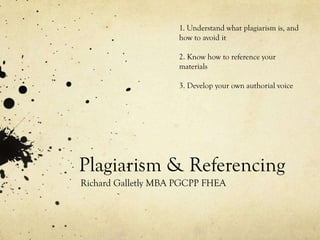
Plagiarism and Referencing
- 1. 1. Understand what plagiarism is, and how to avoid it 2. Know how to reference your materials 3. Develop your own authorial voice Plagiarism & Referencing Richard Galletly MBA PGCPP FHEA
- 2. Kidnapper–Plagiarius–Literary theft They have kidnapped my words! – Martial, 103 AD
- 3. Plagiarism–a strategy for success? ROB FAB Milli Vanilli – Grammy winners, ‘best new artists’ 1990 http://youtu.be/cG6fRHzVpNU
- 4. Know your enemy ‘Guaranteed’ Undergraduate 1st: £460. Tempted? http://www.writemyessay.co.uk/
- 6. Students’ reasons for plagiarism Ellery, 2008
- 7. Fair punishment? or imposed values? - In 2006, an Australian lecturer charged his entire class with academic misconduct for plagiarism (East, 2009) - 60 students at Harvard suspended in unprecedented cheating scandal, February 2013 Justice, Responsibility, rights relationship and rules and care Cultural differences: perceptions of what is fair & acceptable?
- 8. Citations in text Read the source; comment, reflect, assess, critically evaluate, discuss - & then cite!
- 9. Patchwork essay: ‘patchwriting’ Knowledge telling / knowledge transformation? Part of a process of writing in a second language?
- 10. Your own voice in the essay Trying to stand out in a crowd of other people’s ideas?
- 11. Though students may be considered experts in the use of new technologies, including emerging learning technology such as Youtube, it is not known how best to My voice implement this learning tool for optimal student learning. Not only does the design of these videos need to take into account the differing backgrounds of the students, the capacity of these students to recall the information presented, and to use this effectively to complete tasks should also be considered. This is known My voice as the ‘cognitive load’, where a lecture may cover a great deal of insights, information and detailed content, it has been argued that the video should be shorter and more casual in its design (Seery & Donnelly, 2011 p670). Voice of S & D
- 12. Reporting on other sources Ken Hyland, 1999 - Reporting verbs used in citations
- 13. A conflicting maze of ideas Guide your reader through the concepts using rhetorical strategies (discussion/ argument/ evaluation/ criticism)
- 15. Harvard Referencing Guide http://libweb.anglia.ac.uk/referencing/harvard.htm
- 17. Finding citations using http://scholar.google.co.uk/
- 18. According to Jones (1998), APA style is a difficult citation format for first-time learners. http://owl.english.purdue.edu/owl/resource/560/02/
- 19. Should major companies take Fair Trade seriously? Read > Summarise > Discuss, Reflect, Critically Evaluate > Write (& Cite!) - a wide possibility of different answers will prevent plagiarism; - Include your experiences, research your own examples and cases
Hinweis der Redaktion
- http://web.ebscohost.com/search.proquest.comhttp://www.jstor.org/http://libweb.anglia.ac.uk/referencing/harvard.htmhttp://owl.english.purdue.edu/owl/resource/560/02/Using google scholar for citations